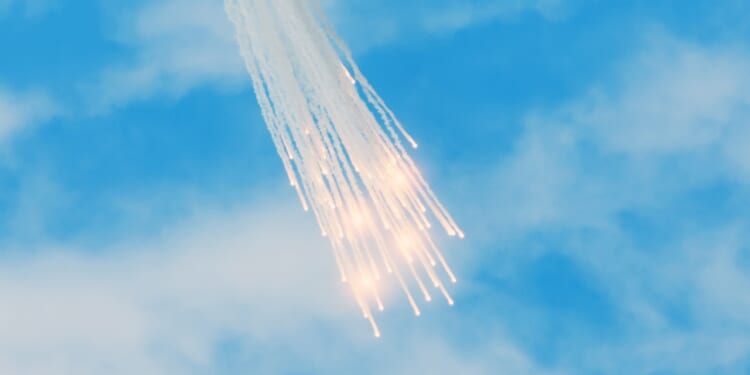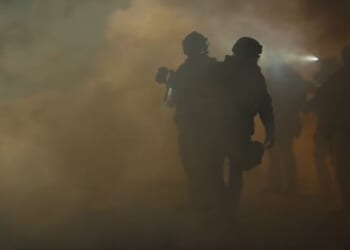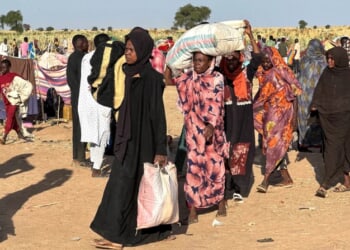It is beyond dispute that Thailand used white phosphorus munitions during its recent border clashes with Cambodia. Whether those munitions were actually used as “chemical weapons,” however, is unclear.
As always, wars are both surrounded by a bodyguard of lies—and cascade the world with propaganda aimed at making the enemy look worse than one’s own forces. Take, for instance, the recent claim from the Cambodian government, still smarting over its loss to Thailand in the recent border dispute, that Thailand’s military had deployed chemical weapons in that skirmish.
Thailand’s government has strenuously denied the use of any chemical weapons—although Bangkok admitted to its forces deploying white phosphorus (WP) munitions in the fighting.
Is White Phosphorus a Chemical Weapon? Depends Who You Ask
Citing the Chemical Weapons Convention (CWC), Thailand’s government asserts that white phosphorus munitions are not classified as chemical weapons. Maj. Gen. Winthai Suvaree argued that WP was used by Thai forces for “smoke, illumination, explosives and incendiary purposes,” rather than as a chemical incapacitant. The United States military also deploys WP munitions for use as smoke for cover—concealing troop movements—and to mark positions.
It is likely that, with the Thai military being so close in organization and doctrine to the US military, that they, too, used WP in similar ways.
Cambodia’s government counters that the WP munitions fired by Thai forces were deliberately used to harm civilians and that, in turn, implies that these systems were deployed as chemical weapons—thereby violating the CWC Protocol III.
Of course, Thailand has not yet signed CWC Protocol III, whereas Cambodia has. In this situation, though, there is a high degree of diplomatic brinkmanship and maneuvering as the two sides, while having stopped fighting, are still waging the non-kinetic side of the war. In other words, honesty is not a high priority in these matters.
Why Does the Use of White Phosphorus Matter?
The Thai Army is attempting to frame its WP use as legitimate under the law of armed conflict. They are insisting that WP is not a chemical weapon—because, if they allow for that definition to take hold, it will lead to both reputational and possible legal damage in international courts.
Plus, Thailand performed brilliantly in the war itself, and is trying to maintain that victorious image over the Cambodians.
To be sure, as the CWC makes clear, using WP is in a bit of a grey zone. On the one hand, it is a conventional munition used for illumination or smoke screens. One the other, if it is used against personnel or civilians, its effects are typically horrific. These include severe burns, smoke inhalation damage, and the like. WP gives Thailand capabilities in contested terrain such as the jungles which define the geography of the entire region, but its use carries great moral and legal risks.
Many observers of the conflict are perceiving Thailand’s use of WP in combat against their Cambodian foes as part of a larger campaign to signal to Phnom Penh that Thailand is resolved to preserve its territorial integrity and defend its interests at all costs.
Where Do Thailand and Cambodia Go from Here?
A mid-sized country—Thailand—has asserted its dominance in a contested frontier by using a controversial and dangerous munition. Yet, it used a munition that Thai leaders knew existed in a legal gray area.
Meanwhile, Cambodia, the weaker power, seeks to redress its military deficiencies to the arena of international law, where Phnom Penh believes it has a better chance of victory. Cambodia might next try to elevate this matter to the United Nations to impose greater reputational and legal damages upon Thailand, which so clearly defeated Cambodia in combat.
About the Author: Brandon J. Weichert
Brandon J. Weichert is a senior national security editor at The National Interest. Recently, Weichert became the host of The National Security Hour on America Outloud News and iHeartRadio, where he discusses national security policy every Wednesday at 8pm Eastern. He is also a contributor at Popular Mechanics and has consulted regularly with various government institutions and private organizations on geopolitical issues. Weichert’s writings have appeared in multiple publications, including The Washington Times, National Review, The American Spectator, MSN, The Asia Times, and others. His books include Winning Space: How America Remains a Superpower, Biohacked: China’s Race to Control Life, and The Shadow War: Iran’s Quest for Supremacy. His newest book, A Disaster of Our Own Making: How the West Lost Ukraine is available for purchase wherever books are sold. He can be followed via Twitter @WeTheBrandon.
Image: Shutterstock / aapsky.

















